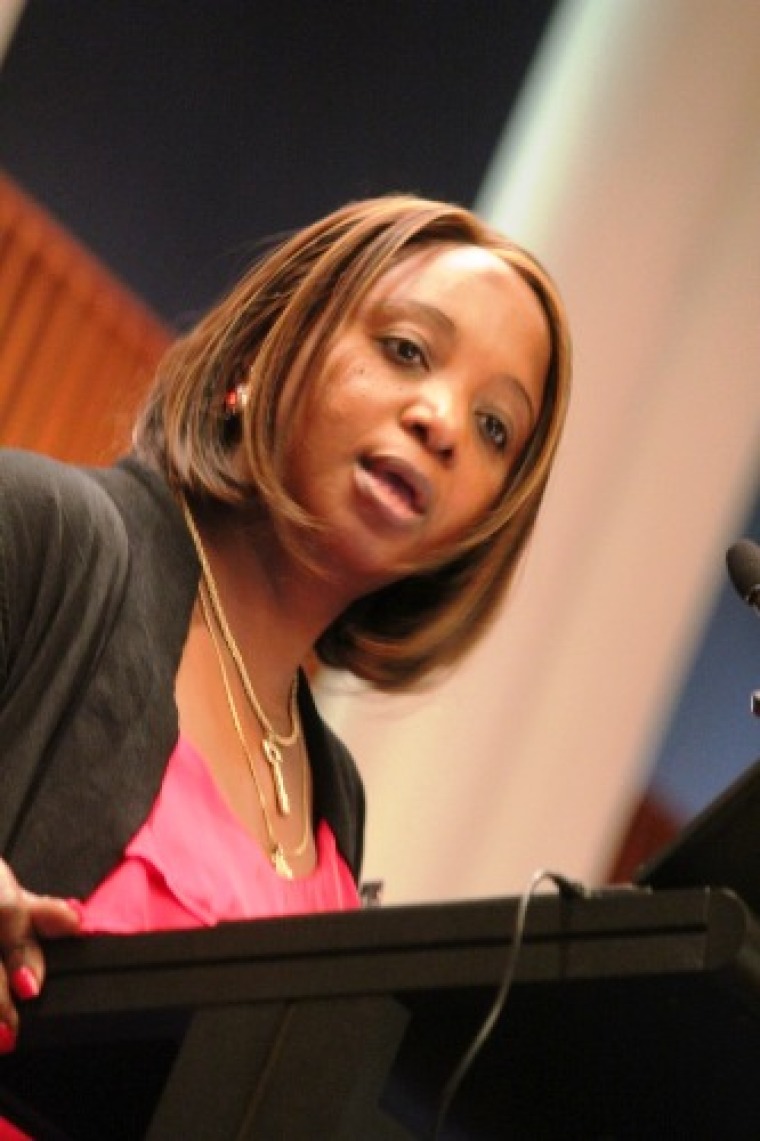
Lulu Mitshabu, a Congolese refugee and Africa Programs Coordinator for Caritas Australia was asked to share her powerful and moving story of her work for women and children in the Democratic Republic of Congo (DRC).
Lulu did not disappoint the more than 200 parliamentarians, religious leaders and interested members of the public who had gathered for the event early Monday morning.
In a setting which saw prayer led by as diverse a group as opposition leader Tony Abbott, Labor and Liberal MPs and Senators, military chaplains, religious sisters, Catholic Bishops and singers from the Hillsong Church, Lulu Mitshabu addressed the crowd with the horrific stories of women and children in her homeland, and the continuing issue of sexual violence in that country.
"Murder and death of the scale at which people experience it in Congo is devastating; yet the tragedy is not restricted to those who have lost their lives. In the DRC, sexual violence is out of control. The UN estimates that 2,000 women were raped in North Kivu province, (in the Eastern part of DRC) in June 2008 alone. Those who suffer rape and other forms of sexual violence often suffer far beyond the trauma of the actual event", she said.
Lulu's story was poignant, focusing on the difficult issues plaguing many African nations and the stigma women experience following sexual violence.
As part of her address, she told the story of Judith Kiakimwe, a teenager from Rusthuru.
"During my last visit to Congo in May 2010, Judith told me that she was abducted from her home and forced into prostitution. For more than a month, Judith was forced to have sex with dozens of men each day and was forced to cook and care for these men after they killed six members of her family. She was turned into a slave, with no control over her body or life. Judith Kiakimwe was one of the lucky ones. She eventually escaped, pregnant, with no family and no support; her perpetrators were never charged with kidnapping or sexual assault – they remain free to commit the same atrocities again. For thousands of other women and teenagers like Judith, the nightmare never ends", she said.
Lulu's presentation, while devastating in its content had a strong message. While she shared candidly about the atrocities committed against women in the Congo, she emphasised that her own is now a story of hope.
"I was forced to flee my country with my babies in my arms and all I could carry on my back, because they could not tolerate a woman like me speaking out for justice, for truth and for what is right. After almost a year living in Zambia I was reunited with my husband who had also been forced out under threat of his life. We had another baby and finally we arrived in Australia in late 1990", she said.
"Of course I was very pleased to arrive in Australia, though it was difficult. There weren't many Africans in Sydney or in Australia at the time, and definitely not many from the Congo. The food was very different and I must say that I still struggle to eat a meat pie with tomato sauce!"
"My first language was Swahili and I also spoke three other languages plus the official language of my country; French. Yet when I arrived I had no English – it was a further challenge", she said.
"Today though, thanks to the generosity I found in Australia, to the many that have assisted us, and also to a fair amount of hard work from all of us – we have a wonderful life in Australia. I have six wonderful daughters and a loving husband."
Lulu stresses that because of the support she receives from her family, she continues to speak out for women in the DRC. The situation in the country is still one of strife, and she responds to this by monitoring Caritas' work there.
Lulu responds in a practical and hands-on way, and has the inside knowledge to inform her work coordinating the Africa and Latin America programs for Caritas. She knows that being in Australia and working in development is a way in which eventually, her country can rebuild and the lives of women can be repaired.
"Rape in the DRC is both a weapon and a consequence of war. Though no statistics are officially kept, at a minimum, tens of thousands of rapes and mutilations have taken place during the past decade. The subject of rape is taboo in DRC. Women who have been raped and their babies born of rape are often rejected by their own families."
As part of Caritas' program work in DRC, rehabilitation centres are run for women who have experienced sexual violence and rejection from their families. It is a work which is long-term and requires much commitment and resolve. But Lulu has her own story, and her daughters as her inspiration.
"I am the mother of daughters and they have a life here in Australia that if I had not fled -they are unlikely to have known."
Following the prayer breakfast, Lulu joined a panel discussion, moderated by Channel 10 Bureau chief Paul Bongiourno, on the human cost of trafficking. Once again she was able to discuss the impact that sexual violence has on people, particularly women throughout the world.
